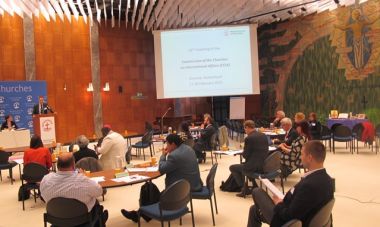Religious violence is 'defining issue for our generation', says Archbishop's representative

Violence in the name of religion is "a defining issue of our generation", according to a senior Anglican clergyman.
Canon David Porter was appointed by the Archbishop of Canterbury as director for reconciliation at Lambeth Palace. He was speaking to members of the Commission of the Churches on International Affairs (CCIA) of the World Council of Churches (WCC) at a meeting aimed at setting the Commission's future work.
According to the WCC, at the meeting Porter said that religiously sanctified violence is a global challenge, and not just an issue of the Arab world. "The reality is that those promoting such violence are looking deep into their own religious traditions and are attempting to find justifications for their actions," he said.
"It isn't just a façade; for many it comes with a deep ideological commitment from their tradition, as they understand it. Therefore the challenge for us is to look again into all religious traditions and see how traditions and texts are used to justify violence."
Porter stressed the need to delve deeper into what instigates young people to be attracted to the views articulated by extremists. He said for many young people this is an ideological issue with several reasons behind much of their anger and violence.
He stressed the need for a safe space for religious leaders, where they can openly and honestly address the question of why people are seduced by extremist narratives.
Other contributors also noted that religion was only one factor in the rise of violence. Audeh Quawas, a member of the CCIA from Jordan, said: "Injustice, corruption and dictatorships are major reasons that incite violence in communities and societies."
Peter Prove, director of the CCIA, highlighted the historical role of the churches in international affairs, manifested by the work of the CCIA since its foundation in 1946, two years before the WCC itself.
"From the outset, CCIA played an important role on behalf of the churches, especially in the formative process of the United Nations and drafting of the Universal Declaration on Human Rights," he said.











